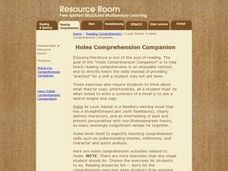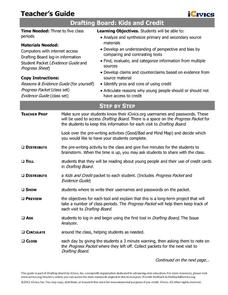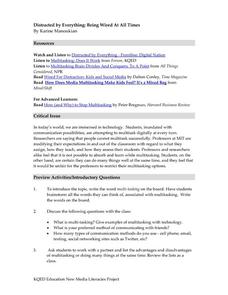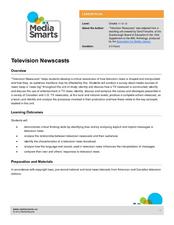Scholastic
Extension Activity Building a Healthy Classroom Community
Workout buddies aren't just for adults! Learners discuss the benefits of 60 minutes of physical activity each day and generate ideas for how they can accomplish this by working toward a goal with friends.
Curated OER
Holes Comprehension Companion
Here is a one-stop planning resource for Louis Sachar's Newbery Award-winning book Holes. You'll find 21 links to worksheets and various activities designed to span the entire book. Learners draw to help analyze settings and...
Student Handouts
Think-Pair-Share
Ever ask students to share their thoughts with a partner, but then hear them only talking about their weekend plans? Nip that common classroom practice in the bud with this worksheet, in which class members log the content of their...
Core Knowledge Foundation
Unit 9: The Science of Breakable Things by Tae Keller
A novel study examines The Science of Breakable Things by Tae Keller. Fifth graders participate in daily readings, discussions, and assignments following an "ask, explore, imagine, observe, and understand" routine. A final performance...
ReadWriteThink
Webcams in the Classroom: Animal Inquiry and Observation
Boost observational skills with an inquiry-based lesson that takes scholars on a virtual field trip. With help from webcams, learners observe animals in a zoo or aquarium. Observations go into a journal and a discussion is held to review...
Out-of-School Time Resource Center
Nutrition and Physical Activity
Emerging nutritionists explore what it means to be healthy. In the beginning of the unit, your class will examine the five food groups and learn how food gets from the farm to our plates. This leads into the investigation of...
iCivics
Drafting Board: Kids and Credit
Should kids under the age of 18 be given access to credit cards? Learners identify pros and cons of using credit, develop claims based on evidence, and finally argue reasons for or against credit for minors.
Nemours KidsHealth
Stress: Grades 6-8
Two lessons take a close look at stress. In lesson one, scholars identify common stressors and examine stress management strategies. Lesson two challenges pupils to keep a stress log for four weeks to aid in their personal journey of...
EngageNY
Identifying Main Ideas and Supporting Details: What’s Going On in the Teenage Brain?
What's going on in the teen brain? Pupils consider the question as they continue reading an informational article about the topic. While reading, they use a Thinking Log worksheet and an anchor chart to track their understanding of...
Penguin Books
The Jungle
It's a jungle out there! Teachers gain information to guide learners through reading The Jungle by Upton Sinclair. Instructors give an overview of the characters in the story and a summary of each chapter. The resource includes questions...
Student Handouts
Graphic Organizer: Reference Citations
Pupils practice researching sources and logging citation information with this graphic organizer. After posing a general topic, groups of students are asked to devise general questions about that topic, and to research sources...
NPR
Distracted by Everything - Being Wired at All Times
This multimedia activity challenges media-savvy learners to look at the critical issue concerning the inundation of technology and multitasking in the classroom, and its effects on the education of themselves and others. The tasks...
Odyssey of the Mind
Odyssey of the Mind Curriculum Activity: Mathematicus Dramaticus
The best part about this resource is that you've got four wonderful activities to choose from. Each of the projects can work together or on its own to help learners understand the history of math and how it can be seen every day. In...
Forest Foundation
The Web of Life
Producers, herbivores, carnivores, omnivores, decomposers. To begin a study of the forest ecosystem, learners examine the connections among the members of ecological communities.
New York City Department of Education
Grade K Literacy in Social Studies: Thinking About Families
Family is a wonderful subject for little learners to get excited about. Family is also the theme for a social studies unit that uses literacy standards throughout. The guide outlines approximately three weeks of instruction and breaks...
Social Skills Central
Ready, Set, Respond!
When faced with a difficult situation, do you respond selfishly, face it head on, or ignore the problem? This game encourages learners to evaluate the wide range of reactions we can have to problematic situations, and how our responses...
Curated OER
Television Newscasts
When we watch news broadcasts on television, we receive a much more visual perspective than when we read the newspaper. How do sets, clothing, and music contribute to our understanding of the story? Compare American and Canadian news...
NOAA
Biological Oceanographic Investigations – What's in That Cake?
Have you ever tried to find hidden items in a picture when you don't know what you are looking for or how many things are hidden? A lesson applies that same concept to sampling the deep sea habitats. Participants must first create a...
Illustrative Mathematics
Exponentials and Logarithms II
Learners are given a logarithmic function and its inverse exponential function. The task, which is to graph both compositions of the two functions, uses the inverse nature of exponents and logarithms to generalize about the properties of...
Curated OER
Home Living / Daily Living Lesson Plan—Mastery Healthy Food
Everyone needs to know how to eat well to stay healthy. Learners with mild disabilities log what they eat, discuss food choices, and review healthy foods. The lesson plan could be used to foster living skills in high-functioning...
Pulitzer Center
Extractive Industries
Here is a chance for environmental studies classes to take a critical look at crises occurring around the globe by reading articles and viewing video clips. The human activities under scrutiny are the extraction of oil, logging, and...
Illustrative Mathematics
Exponentials and Logarithms I
This task focuses on using the verbal definition of the logarithm to understand that a logarithm is an exponent. Learners complete six computational exercises using the inverse properties of logs and exponents and answer two...
Polar Trec
What Is My Footprint?
How do one's habits and lifestyle choices affect the environment? Through a short online survey, learners will calculate their own carbon footprints then determine how to reduce their impact on the environment through simple steps, such...
Curated OER
Don't Believe the Type: Internet Ethics
What is Internet fraud? Explore Internet ethics and engage in a collaborative discussion. In order to create a Guide to Internet Honesty, learners read and discuss the article "A Beautiful Life, A Tragic Death, a Fraud Exposed." Then...























